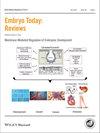Weiguang Wang, Diana Rigueur, Karen M. Lyons
下载PDF
{"title":"TGFβ signaling in cartilage development and maintenance","authors":"Weiguang Wang, Diana Rigueur, Karen M. Lyons","doi":"10.1002/bdrc.21058","DOIUrl":null,"url":null,"abstract":"<p>Members of the transforming growth factor beta (TGFβ) superfamily of secreted factors play essential roles in nearly every aspect of cartilage formation and maintenance. However, the mechanisms by which TGFβs transduce their effects in cartilage in vivo remain poorly understood. Mutations in several TGFβ family members, their receptors, extracellular modulators, and intracellular transducers have been described, and these usually impact the development of the cartilaginous skeleton. Furthermore, genome-wide association studies have linked components of the (TGFβ) superfamily to susceptibility to osteoarthritis. This review focuses on recent discoveries from genetic studies in the mouse regarding the regulation of TGFβ signaling in developing growth plate and articular cartilage, as well as the different modes of crosstalk between canonical and noncanonical TGFβ signaling. These new insights into TGFβ signaling in cartilage may open new prospects for therapies that maintain healthy articular cartilage. Birth Defects Research (Part C) 102:37–51, 2014. © 2014 Wiley Periodicals, Inc.</p>","PeriodicalId":55352,"journal":{"name":"Birth Defects Research Part C-Embryo Today-Reviews","volume":"102 1","pages":"37-51"},"PeriodicalIF":0.0000,"publicationDate":"2014-03-27","publicationTypes":"Journal Article","fieldsOfStudy":null,"isOpenAccess":false,"openAccessPdf":"https://sci-hub-pdf.com/10.1002/bdrc.21058","citationCount":"199","resultStr":null,"platform":"Semanticscholar","paperid":null,"PeriodicalName":"Birth Defects Research Part C-Embryo Today-Reviews","FirstCategoryId":"1085","ListUrlMain":"https://onlinelibrary.wiley.com/doi/10.1002/bdrc.21058","RegionNum":0,"RegionCategory":null,"ArticlePicture":[],"TitleCN":null,"AbstractTextCN":null,"PMCID":null,"EPubDate":"","PubModel":"","JCR":"Q","JCRName":"Medicine","Score":null,"Total":0}
引用次数: 199
引用
批量引用
Abstract
Members of the transforming growth factor beta (TGFβ) superfamily of secreted factors play essential roles in nearly every aspect of cartilage formation and maintenance. However, the mechanisms by which TGFβs transduce their effects in cartilage in vivo remain poorly understood. Mutations in several TGFβ family members, their receptors, extracellular modulators, and intracellular transducers have been described, and these usually impact the development of the cartilaginous skeleton. Furthermore, genome-wide association studies have linked components of the (TGFβ) superfamily to susceptibility to osteoarthritis. This review focuses on recent discoveries from genetic studies in the mouse regarding the regulation of TGFβ signaling in developing growth plate and articular cartilage, as well as the different modes of crosstalk between canonical and noncanonical TGFβ signaling. These new insights into TGFβ signaling in cartilage may open new prospects for therapies that maintain healthy articular cartilage. Birth Defects Research (Part C) 102:37–51, 2014. © 2014 Wiley Periodicals, Inc.
tgf - β信号在软骨发育和维持中的作用
转化生长因子β (TGFβ)超家族的成员在软骨形成和维持的几乎每个方面都起着至关重要的作用。然而,TGFβs在体内诱导软骨作用的机制仍然知之甚少。一些TGFβ家族成员及其受体、细胞外调节剂和细胞内换能器的突变已经被描述,这些突变通常影响软骨骨骼的发育。此外,全基因组关联研究已经将(TGFβ)超家族的成分与骨关节炎的易感性联系起来。本文综述了近年来在小鼠生长板和关节软骨发育过程中tgf - β信号的调控,以及典型和非典型tgf - β信号之间的不同串扰模式。这些关于软骨中TGFβ信号传导的新见解可能为维持健康关节软骨的治疗开辟新的前景。出生缺陷研究(C辑)(2):37 - 51,2014。©2014 Wiley期刊公司
本文章由计算机程序翻译,如有差异,请以英文原文为准。



 求助内容:
求助内容: 应助结果提醒方式:
应助结果提醒方式:


